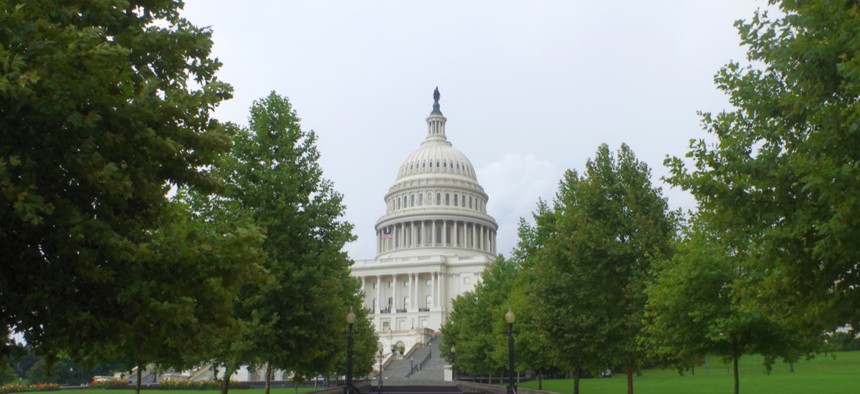Senators Stuck in Washington Focus on Elections

nega/Shutterstock.com
The Senate also passed an $860 million “minibus” funding bill.
Senators may have been stuck in Washington rather than home campaigning last week, but they sure had elections on their minds. Here’s a rundown.
Security Bill Delayed as Midterms Approach
The Senate Rules Committee abruptly postponed a Wednesday meeting during which members were expected to forward the Secure Elections Act, a compromise bill aimed at improving election security before the November midterms.
The delay reportedly came at the urging of the White House.
Sen. Amy Klobuchar, D-Minn., the bill’s lead Democratic sponsor, assailed the delay, saying time is running short to make vital improvements before the midterms.
“With only 76 days before the election, with cyberattacks from Russia and other countries and criminal enterprises being revealed every day, with no national requirement for critical security protocols such as audits or backup paper ballots for our nation’s election infrastructure, we must take action before the next election,” Klobuchar said.
What Aren’t Those Oligarchs Investing In?
Once the Rules Committee does get around to marking up the Secure Elections Act, Sens. Ben Cardin, D-Md., and Chris Van Hollen, D-Md., want to make sure it includes an amendment that requires election infrastructure vendors to disclose any foreign ownership ties.
The concern was sparked after the senators learned that a Russian oligarch is the majority shareholder in a fund tied to the company that hosts Maryland’s voter registration system and a webpage for county-level election results.
Trust but Verify
A bipartisan quartet of senators also wrote to the CEO of a major election systems vendor last week, urging the company to allow independent cybersecurity audits of its systems.
The letter to Election Systems and Software, or ES&S, comes after the company dismissed a hacking demonstration at the DEF CON security conference’s Voting Village earlier this month. The company argued the demonstration didn’t realistically simulate the conditions actual hackers would face during a real election.
“We believe that independent testing is one of the most effective ways to understand and address potential cybersecurity risks,” the letter from Sens. Kamala Harris, D-Calif., Mark Warner, D-Va., James Lankford, R-Okla., and Susan Collins, R-Maine, states.
Let’s Just Stick With Paper
Finally, a bill from Sen. Ron Wyden, D-Ore., which would require paper ballots for all elections, gained four new cosponsors last week along with the endorsement of two voting rights advocacy groups, the Brennan Center Democracy Program at New York University and Color of Change.
The new cosponsors for the Protecting American Votes and Elections Act are Sens. Kamala Harris, D-Calif., Richard Blumenthal, D-Conn., Brian Schatz, D-Hawaii, and Bernie Sanders, I-Vt.
That’s One Big Minibus
Looking beyond election security, the Senate on Thursday passed a massive appropriations bill that will fund Defense, Health and Human Services, Labor, Education and related activities in fiscal 2019. The nearly $860 billion minibus would account for some two-thirds of the government’s annual discretionary spending.
“[The bill] provides critical resources for a wide range of priorities that are essential to maintaining our technological superiority in an increasingly complex and competitive national security environment,” Senate Appropriations Chairman Richard Shelby, R-Ala, said in a statement. The minibus includes “substantial investments” in innovative energy technologies, artificial intelligence, microelectronics, cybersecurity and other areas, he added.
The package would also increase funding for the National Institutes of Health by $5 billion over fiscal 2017 levels while also boosting Child Care Development Block Grants by $3.2 billion and devoting an extra $3 billion to fighting the opioid epidemic. It also raises funding for telehealth programs to connect medical specialists to rural patients.
The legislation, which passed 85 to 7, marks a rare display of bipartisanship in the often contentious appropriations process. It now moves to the House for approval.
Big Ideas Department
Senators spitballed a slew of cyber ideas during a hearing of two Senate Judiciary Committee panels Tuesday.
Sen. Sheldon Whitehouse, D-R.I., urged a roving cybersecurity inspector general who could oversee penetration testing and other cyber audits across the federal government. Whitehouse also urged a major review of the National Institute of Standards and Technology’s cybersecurity framework for industry to see if it needs updating.
Sen. Chris Coons, D-Del., meanwhile, suggested creating a permanent select Senate committee for cybersecurity made up of the chairs and ranking members of all the standing committees with cyber authority. That structure could cut through some of the jurisdictional jockeying that currently undermines cyber legislation, Coons said.
Earlier that same day, the Homeland Security Department’s cyber and infrastructure protection lead Chris Krebs told Senate Banking Committee members that the department will be organizing a “national situational awareness room” on Election Day. The room will function something like a chat room about cyber threats for election officials, Krebs said.
Coming Up
This will be a pretty light week on the Hill.
At 10 a.m. Wednesday, the Senate Commerce Committee will consider Kelvin Droegemeier’s nomination to be director of the White House’s Office of Science and Technology Policy among other business. Committee members will also mark up the Supporting Veterans in STEM Careers Act.





